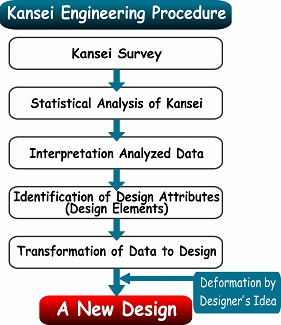Is Kansei Engineering Coming West?
Kansei Engineering originated in Japan and is a structured approach to sensorial design or designing for the senses. It has shaped many successful products including Mazda’s cars and Sharp’s introduction of the LCD-based camcorder which allowed them to capture an extra 21% of that market.
The relationship between “Kansei” or sensory and mental states and the product’s features, functions and form are empirically studied. The findings are used to design new products and services that include specific elements (features, functions, form) to create a sensory or mental impact.
The modeling and analysis is focused on product semantics or a statistical analysis of Kansei words (mostly adjectives that describe perceptions, emotions, impressions and feelings) and how changes in particular product featuress correlate to the words. Data is gathered from user surveys and statistical analysis can be done using regression, principal component analysis or more exotic pattern finding techniques such a neural nets, genetic algorithms and rough sets. Questions are designed using bipolar attributes and participants are asked to rate where a product falls on a continuum or scale (e.g. simple to complex or exciting to boring). In some approaches, enthnographic, observational and interviewing techniques are also used to get at Kansei words.
A flowchart from the International Kansei Design Institute illustrates the process:
The correlations and patterns are somewhat subjective so the analysis is used to build up a psychographic profile that clusters users with a common set of feature-perception-mental state response patterns. In many ways this is the psychological component of quality functional deployment or QFD where you establish the connection between a design element or product feature and the customer’s psychological benefit. A short article of lifestyle QFD and Kansei Engineering that explains this approach can be found here.
Instinctive Choice, a UK design firm that uses Kansei Engineering provides a nice two-page overview of their approach and illustrates the basic ideas using a cell phone.
Product features such as screen size, phone/body shape, button style and phone color are correlated to a Kansei (perceptions or psychology) of inspiration, stylish, youth, active, masculine and creative.
It works on the service side too. Call center wait times, length of lock-in on contract, understandability of bills and so on correlate to a Kansei of frustrated, happy, anxious, confident and indifferent. Understanding these psychographic profiles is a powerful tool for designing new cell phones and service plans.
Kansei engineering has been around for 30 years and is just starting to catch fire outside of Japan. As one design blogger recently put it:
“The methodology has enjoyed commercial success in Japan where it was developed to the extent that it has now become embedded in Japanese design practice. Currently, little work is being carried out in Kansei Engineering in the
US or Europe outside of academia.”
A series of recent conferences is hoping to change that. For example, see the 2nd International Conference on Kansei Engineering and Affective Systems is coming up in November and promises to pull in participants from around the world.
Hopefully Kansei is coming West. It is a great tool for introducing sensorial and cognitive design into six sigma, stage-gate engineering and other formal approach to process and product design.







October 7th, 2008 at 8:21 pm
This is good stuff. In my last book, The DNA of Customer Experience:How emotions drives value, we conducted two years worth of research with London Business school and discovered there are 4 Cluster of emotions that drive and destroy value. We have found that if you now link this with Kansei you get something that is really powerful. Check out my blog on the “subconscious experience”.
August 24th, 2011 at 9:49 am
[...] of Waiting Areas in Primary Healthcare that presents a good example. The researchers used the Kansei engineering method to uncover the psychology need to “feel calm” [...]